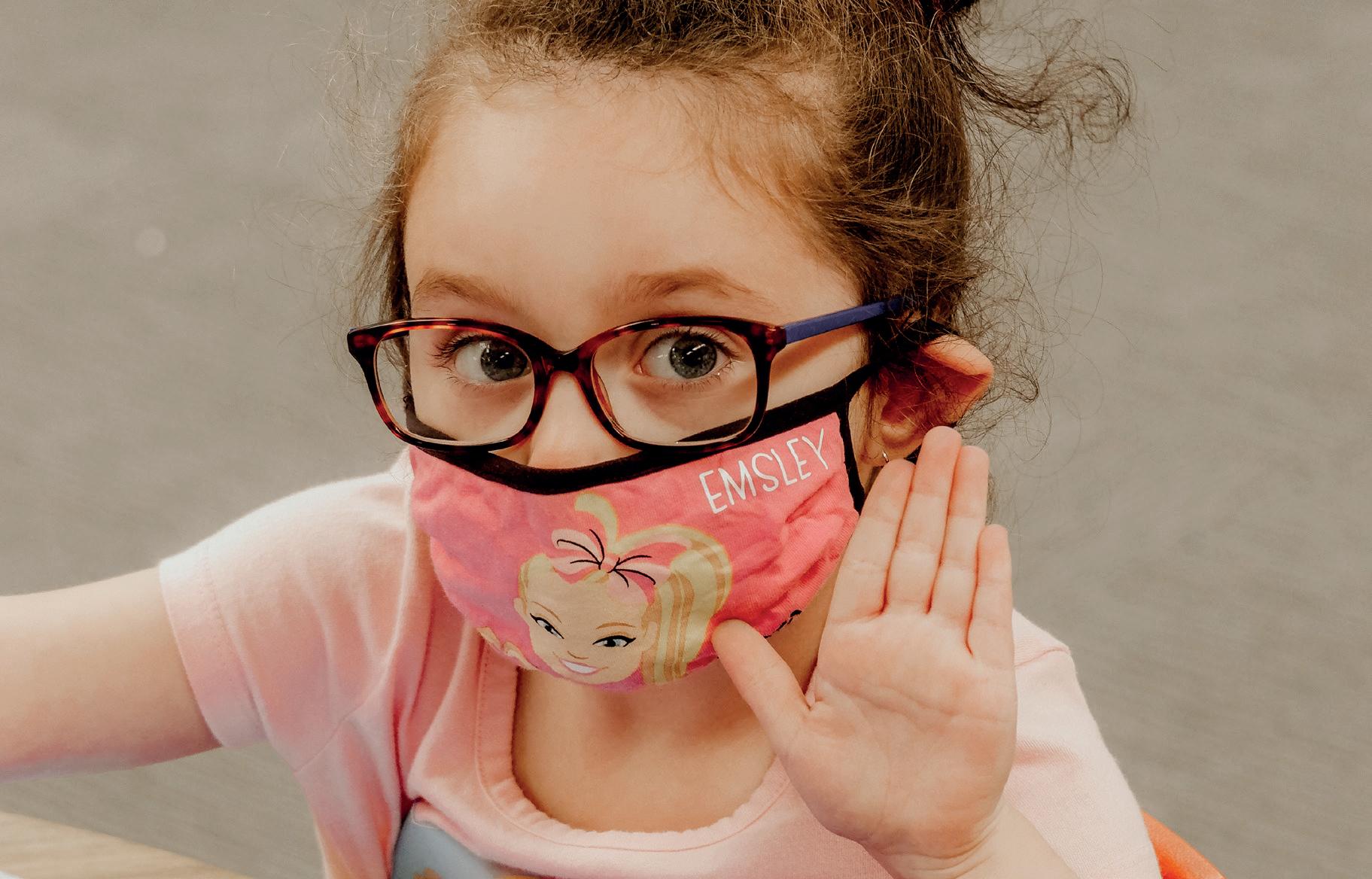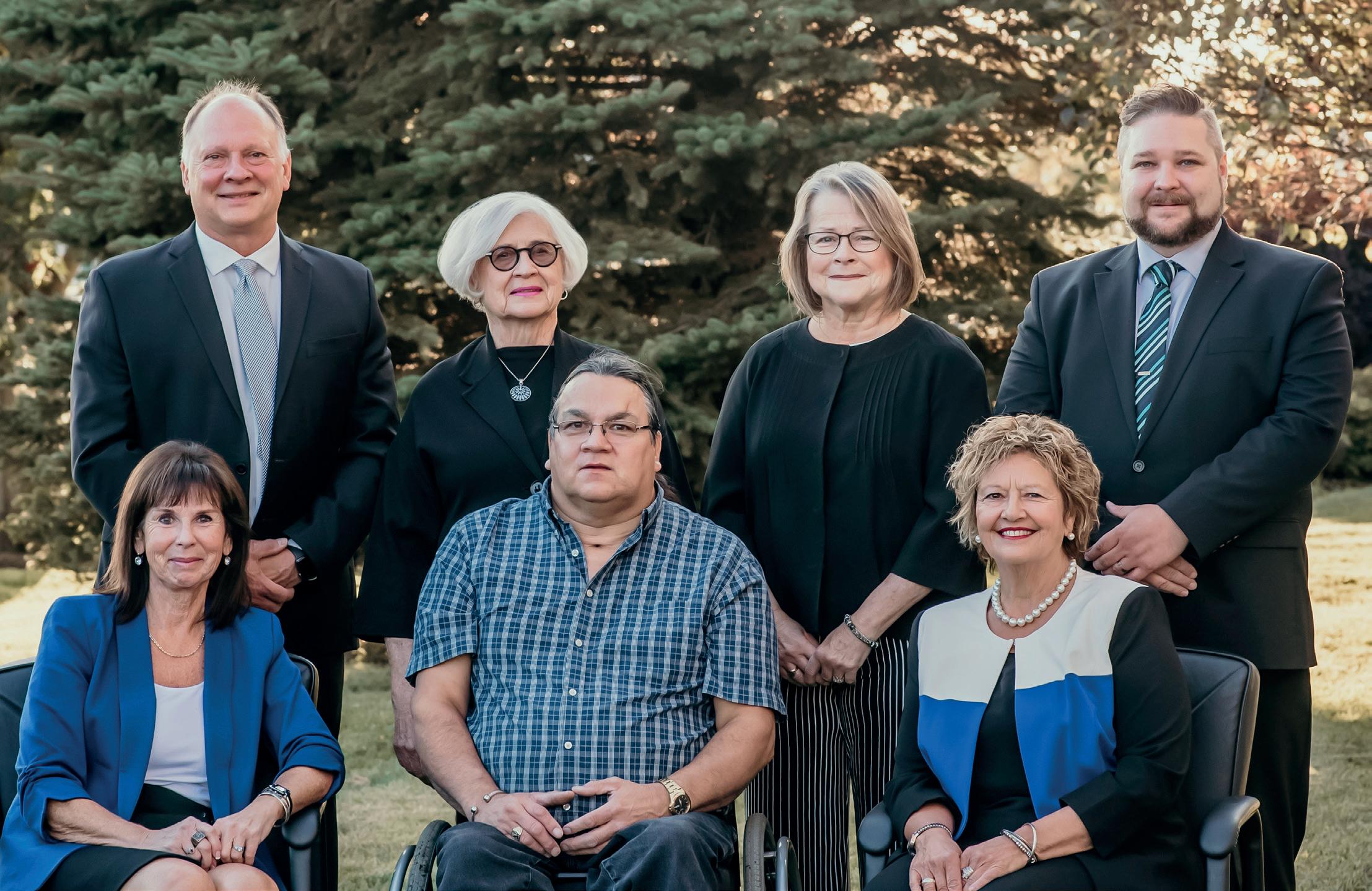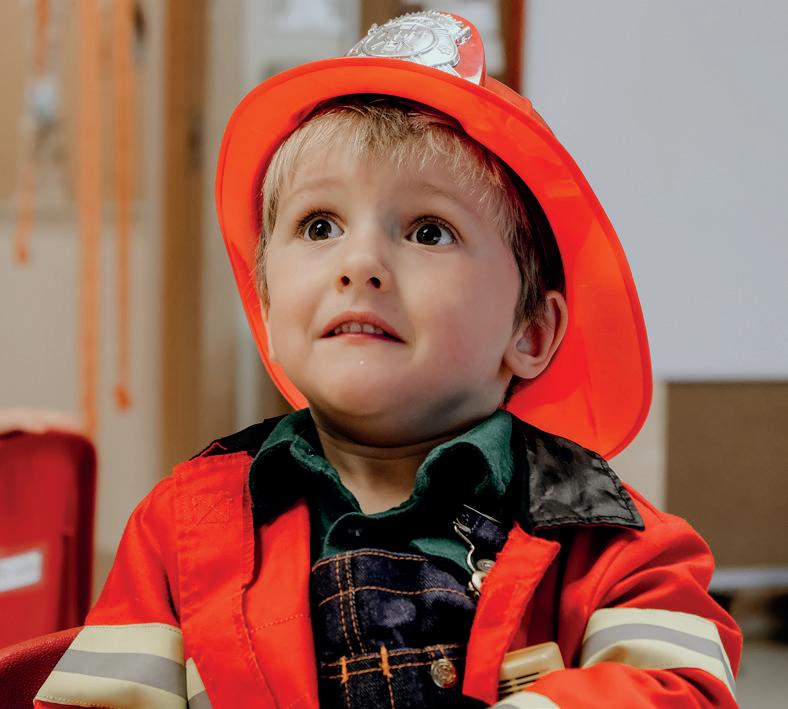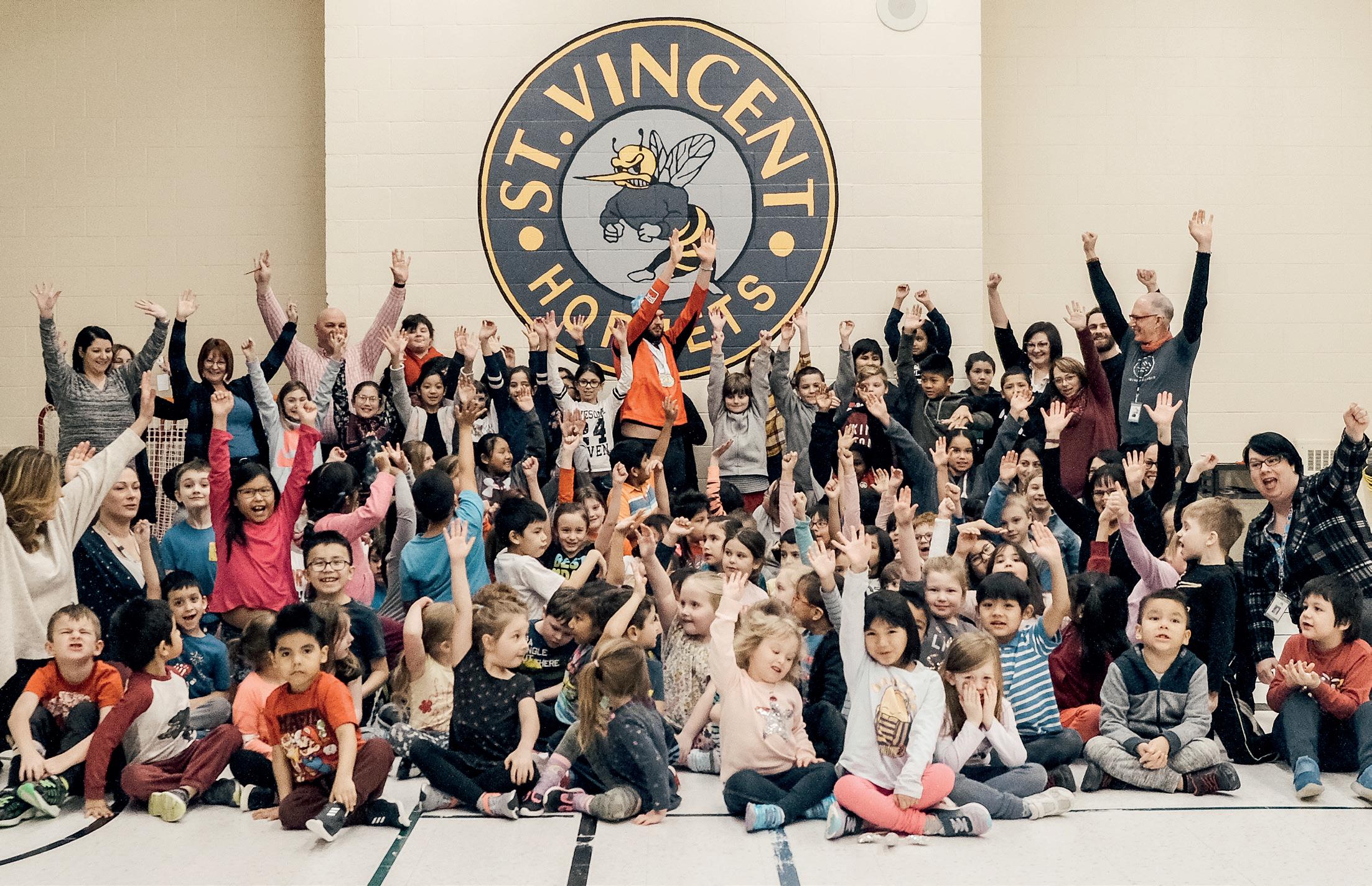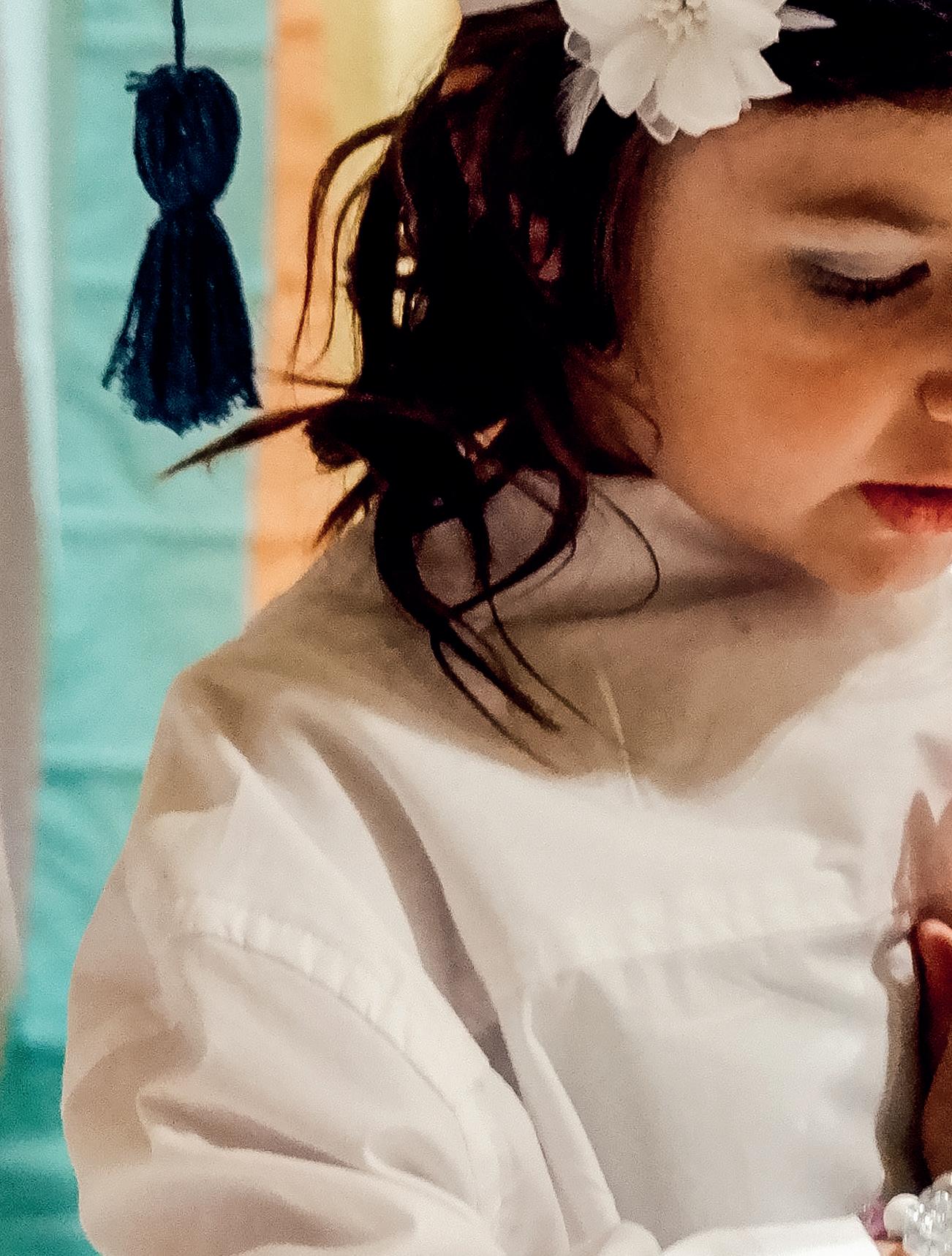
11 minute read
Inspiring Achievement
Mental Health
Our Catholic Faith continued to be at the centre of our efforts to support the social, emotional and spiritual lives of our students. Our efforts were enhanced during the school year by our board’s participation in piloting School Mental Health Ontario’s Faith and Wellness Everyday Classroom Resource, for elementary teachers (k-8). Faith and Wellness was developed with the support of OECTA and informed by Catholic educators. The Resource will be available for widespread use in schools next year.
Advertisement
Supporting LGBTQ Student Inclusion
Our Catholic school communities strive to be places of compassion, inclusion and social justice for LGBTQ+ students, staff and families. Both high schools continue to have and support active and growing Gay Straight Alliance (GSA) clubs. This past year, our senior elementary school students began organizing GSA clubs, reflecting a growing awareness and openness about diversity among our younger students. and a growing acceptance, understanding and responsiveness at a staff level. In our K-6 schools, the Board support requests from staff for more awareness level training on behalf of gender diverse students, staff and families. The goal is to champion enquiry, social justice and human dignity for all through safe, accepting and life affirming learning environments.
PROVIDING LEARNING AND WORKING SPACES THAT ENHANCE PRODUCTIVITY
In our work with New Pedagogies for Deep Learning, we strive to inspire and develop competencies which will engage and enrich student thinking and learning. We continued to work with our Family of Schools to examine Pedagogical Practices, Learning Partnerships, Learning Environments and Leveraging Digital. We have maintained an emphasis on working on the 6 Global Competencies, (Collaboration, Citizenship, Character, Creativity, Critical Thinking, Communication) which align with Learning Skills, Catholic Graduate Expectations, and the Anishnawbe Seven Grandfather Teachings. We were beginning to inquire further with our educators around the Learning Design (planning around Big Ideas in Curriculum, backward design planning and allowing for student voice in the learning). Unfortunately, due to school closures with the COVID-19 Pandemic, we were unable to moderate the Learning Designs and complete our Learning Cycle.
Teachers
Through the implementation of work and learning spaces, both staff and students flourish. Various supports and resources, pertaining to all levels have been provided to Resource teachers. These teachers strategize co-planning and teaching, they develop learning sessions to help colleagues, and continue to support and offer their expertise when needed. Teachers continue to work in collaboration with our Resource Teachers around an inquiry based approach using classroom observations. Teachers coplan and co-teach examining best pedagogical practices and teaching and learning is often centered around professional development sessions in the Mathematics, Literacy and Deep Learning Sessions. Unfortunately, we were unable to complete our PD sessions planned for the year due to COVID and school closures.
Learners
Supporting student achievement is fundamental and assistance from school teams along with our Resource teachers is key. These teachers can be found in our schools (on a rotational basis) working directly with students assisting them with articulation in their thinking and learning, while giving feedback and providing mentorship. During the co-teaching cycle, Resource teachers place emphasis on the metacognitive process in order for students to have an understanding of themselves as learners as well as, help foster social emotional learning.

Administrators
Board Administration is fully involved in student achievement goals and ideals. Mathematics and Deep Learning in particular, have been our main achievement goals at the Board and at the school level. Superintendents, Principals and Vice-Principals have been fully involved in various aspects in methods of attaining success. Administrators are involved with Professional Development opportunities and deep learning framework implementation.
Student Support Persons (SSP) & Early Childhood Educators (ECE)
SSPs and ECEs play a critical role in assisting our learners to flourish and grow within our Board. Professional Development sessions are offered to assist in their roles, with topics ranging from mental health and wellness, new technologies, child welfare reporting and curriculum support for struggling students. This year, many PD sessions were cancelled due to the labour dispute with OSSTF and workplace sanctions, a session on Mental Health in Motion and Workplace Violence was offered to all SSPs. Our Board BMST Trainers were able to pivot quickly during the school closure and offered BMST training virtually. Webinars through the Geneva Centre and Communities Together for Children (Second Step SEL Program) were offered and well attended during the closure period.
Enhancing our Mental Health Support
Our Board continues to prioritize mental health support, resources and services for students through the work of our board Mental Health Leader in collaboration with community partners (CCTB, LHINS, UTURN, Health Unit) and provincially, School Mental Health Ontario (SMHO). We offer brief mental health counselling and support services for all k-12 schools, crisis response services to schools during the school day, coordinated mental health fan-out support to schools following tragic events, student mental health promotion and prevention programming and staff professional development geared to the educator role as well as more advanced professional development for school-based mental health professionals.
This past year we welcomed an additional CCTB School Mental Health Counsellor to our k-6 system to help lower growing wait times for counselling services. We also invested in developing internal suicide awareness training capacity specifically for our k-6 school staff and others working with children under the age of 12 years. Our Urgent Response Guidelines were also finalized this year. The Guidelines support staff response to urgent student mental health situations such as emergencies and crises.
Attendance Matters
In efforts to alleviate school absenteeism, the Attendance Matters committee gathers to collaborate and determine system-wide planning. Through the use of evidence-based tools our Attendance team is able to determine factors contributing to Persistent Absenteeism including: school climate, school safety, community safety and parental access to basic living needs.
The unprecedented impacts of the COVID pandemic on students and families has been profound. To this extent the implementation of strategies to support families includes ongoing community collaboration ensuring access to technology, food security, housing, and mental health supports. By increasing the likelihood of student engagement the overall Persistent Absenteeism during the 2019-20 academic year was decreased by 3%.
Violence Prevention & Threat Assessment
The Board continues to support school and community initiatives and partnerships that prioritize staff and student safety and aim to prevent violence, and respond to threats of violence in a timely and effective manner. The VTRA (Violence Threat Risk Assessment) model was pursued without success by this board and other boards in the region due to different levels of readiness among staff, boards and community partners. Moving forward, the board continues to follow protocols in place with police to maximize student safety and respond to threats of violence.
The Board has also been an active partner in supporting classroom based approaches to violence prevention in partnership with local organizations. This past year the board supported teacher training (Heath & Phys Ed, Religious Education, Guidance) in the Fourth R Healthy Relationships/Violence Prevention Program for grades 7-9. We hope to implement the Catholic Version of the Program next year. The Program has been shown to be effective in building healthy relationship skills and lowering risks of gender-based violence.
Three-Year Math Plan
Professional Development sessions focused on content and pedagogical practices have been key in continued work on the three-year math plan. These sessions allowed for alignment of pedagogy, and were supported by in-class co-teaching sessions with the two math resource teachers who worked at the elbow with classroom teachers in co-learning cycles to assess student thinking in the fundamentals of math. The partnership with Lakehead University has assisted in supporting teachers with practicing and assessment strategies. Due to the COVID pandemic we were unable to complete our professional development sessions for the grade 5 and 6 teachers along with our Intermediate Leads. Planning and support has already begun with the implementation of the new Mathematics Curriculum and we are commencing a more detailed new three year plan which will take us to 2024.
New Pedagogies for Deeper Learning (NPDL)
As stated above, we have continued to grow capacity with our school teams through the use of the collaborative inquiry cycle. Educators are able to customize instruction with their students, assisting with their methods of study and comprehension. Elements of pedagogical practice, learning partnerships and customized learning environments were introduced to learning teams representing all of our schools from K-12 during the 20192020 school year.
Summer Learning Program
In an effort to reduce the summer learning gap, a Ministry summer learning initiative was delivered vir. The three week program, offered from July 6th to 24th, consisted of synchronous online learning each day from 10:00am - 12:00pm using Google Meet. It was open to all student levels and various needs with a specific focus on literacy and numeracy. A class for English Language Learners (ELL) and Social/Emotional Learners (SEL) was also offered. With 99 students from Grades K-8 attending the program, it was considered a huge success.
Summer School
This year, Summer school was offered virtually to students. In addition, a new reach ahead program was offered to students.
Early Years
School educator teams continued their work on Self-regulation and Mindfulness and examined multiple pieces that contribute to calm and balanced classrooms. Professional development in the area of Catholic Virtues in Primary Classrooms, Google Forms/Documentation related to the Four Frames in the Communication of Learning, Physical Literacy and Addendums to Kindergarten Program were all delivered throughout the year.
Kindergarten Skills Camp
A school readiness project program was offered to learners entering Kindergarten. Registration priority was given to students who were flagged in the Ages and Stages Questionnaire and who had not attended a childcare program. This program was developed to assist pre-school children successfully transition into a classroom environment. In collaboration with a community partner agency, a team consisting of a Speech-Language Pathologist, Occupational Therapist, Early Childhood Educator and Communicative Disorders Assistant was secured to implement the program prior to school start up in September 2020. The program included activities to encourage the development of speech and language skills, listening skills, social skills, self-regulation and understanding of routines.
Primary Transition Class
The Primary Transition Class was designed to help TBCDSB students who are entering Grade 1 and 2, to successfully transition into the classroom environment in September 2020. Run by an elementary teacher and Speech Language Pathologist, this transition class focussed on the critical predictors for reading success: oral language development (vocabulary, narrative), phonological awareness, alphabet knowledge, and print concepts. The program also included activities to support fine and gross motor skills and social/emotional skills and self-regulation.
Skills Development Program for K-6 Students with Autism Spectrum Disorder
The program focused on ensuring students identified with Autism Spectrum Disorder understood the Covid-19 virus and the health and safety risks involved. Instruction and communication provided information and interactive activities to develop this understanding. The focus was on developing comprehensive transition plans for each student to help them understand the changes to their school environment and how that will affect them. Additional activities included a focus on communication skill building, encouraging appropriate social skills and the importance of health, wellness and physical activity.
Senior Transition Program (7-12)
After a four month school closure due to COVID-19, the Senior Transition Program was developed and made available to offer to students with special needs in Grades 7 - 12, specifically in the Transition and Lifeskills Classes, the support they required for an individual transition plan to return to school in September 2020. This support included social narratives providing information about Covid-19, as well as specific school and classroom information pertaining to Return to School Guidelines for Health and Safety. Social and/or academic activities were also provided upon request.

Empower Reading
The evidence-based Empower Reading program is an early intervention program developed to assist children and adolescents with difficulties in reading and spelling, into independent, and flexible learners. Our Board continues to deliver the program in 12 of our 15 elementary K-6 schools and one of our two high schools. In addition to the decoding program, 7 teachers received training in the comprehension program and delivered it in their schools to students in grades 3 and 6. Approximately 120 students benefited from the Empower Reading Program.
French Immersion Review
Promotion of our French Immersion programming and French culture is important within our schools and our community. An asset to assist all of our French Language students is providing the opportunity to challenge the DELF (D’iplôme d’études en langue française) exam in order for students to have an understanding of their strengths with their oral, listening, reading and written production skills, as well as, understand areas that require further development. Unfortunately, during the 2019-2020 school year, we were unable to offer the DELF Grade 8, nor the DELF Grade 12 exams due to COVID.
3 Year French Plan
Our three-year FSL plan (2017-2020), has been focused around the provincial FSL Goals. The three main goals being:
Goal 1: Increasing student confidence, proficiency, and achievement in FSL Goal 2: Increasing the percentage of students studying FSL until Graduation Goal 3: Increase student, educator, parent, and community engagement in FSL
During the 2019-2020 school year, there was a continued focus to infuse CEFR principles to transform FSL classroom practices through individual teacher learning through co-teaching, networking and professional learning opportunities. We have seen a steady increase in the number of students challenging the DELF exam. The recertification of our Board DELF “Correcteurs” had to be rescheduled to the fall of 2020. We will be assessing our plan in order to create our new threeyear French Plan.

Board Improvement Plan (BIPSA)
Province-wide Board Improvement Plans are beneficial in refining and assisting with student achievement and well-being for students and staff. With input and assistance from Principals and Student Achievement team members, our BIPSA provides a roadmap of ways to progress and grow in improvement and future planning.
EQAO Targets
As a result of COVID -19, EQAO assessments were suspended during the 2019-20 school year.

